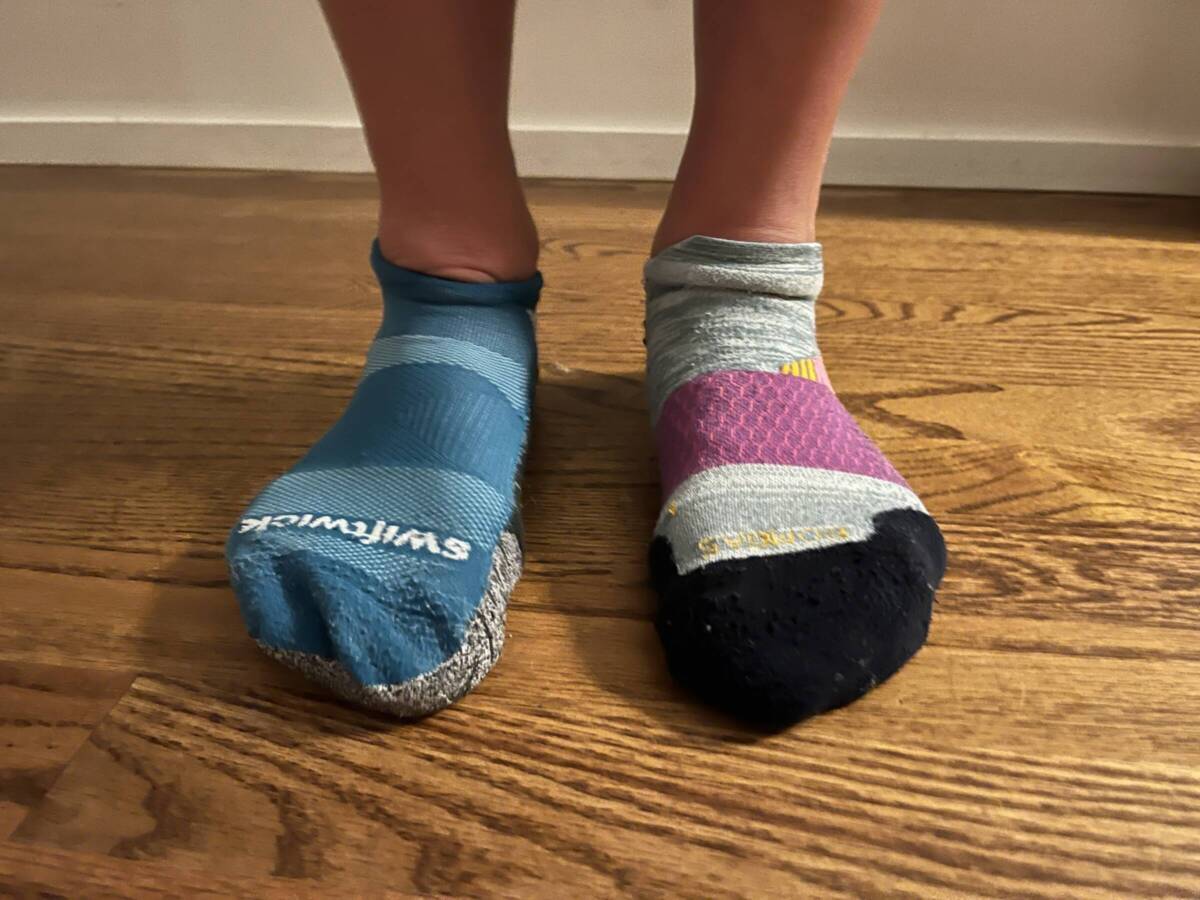Reasons to Take a Break from Running
Here are two common scenarios for runners: you run a race and YOU DO AWESOME! You’re hungry to get another personal best! OR, you run a race and YOU DO AWFUL. It’s time for retribution! Either scenario does not include a planned break from running. The runners go right back into training. But that is a HUGE mistake.

A mistake I have been guilty of time and again. Here’s an example: when I the 2019 Indianapolis Monumental Marathon, I trained for it (HARD, like 100 miles per week) and ran it with a TORN HAMSTRING. But I wanted my one and only shot to try to qualify for the Olympic Trials. I ran a 2:56 dragging my right leg behind me.
Table of contents
- 6 Reasons to Take a Break from Running
- When should a runner take a planned running break?
- What should runners do on their running breaks?
A smart runner would have taken weeks (or even months off) to rehab the injury, let the body heal, and return to homeostasis. What did I do? I took 6 days off and started training for what I deemed was unfinished business. The result? I had to take a running break for most of 2020 to rehab my running injury.
As a running coach, I MAKE (or very strongly encourage) my athletes to take at least a one-week break from running after a big race such as a marathon. I also program regular down weeks (a reduction in training volume, sometimes planned around their menstrual cycle), rest days, and maintenance running periods. Doing these planned running breaks helps promote longevity in body and mind in the sport.
Read on to learn why you should plan easing up on your running on a regular basis–and how to do so.
6 Reasons to Take a Break from Running
Builds immune system back up.
Intense exercise such as races, very hard speed workouts, or very long runs can temporarily suppress your immune system. When your body is running or training hard, it releases stress hormones to your muscles to try to heal them quickly. This means your body is prioritizing this healing over protecting your body from harmful germs. This increases your risk for getting sick.
A running break allows your body to return to hormone homeostasis.
If you train without sufficient breaks from running, your immune system risks being constantly suppressed until you just break down and get sick or experience chronic fatigue.
Allows your body to rebuild.
When your body is running hard, your muscle and tendons actually have micro tears in them that need time to heal. In fact, this study found that a week after a marathon, your skeletal muscle cells are in necrosis.
Thus, if you resume training too soon, you risk a running injury that can lay you off for longer than a few weeks. Plus, you risk decreased performance because your body is still broken down.
Decreases risk of injury.
Most running injuries are overuse injuries as running is a repetitive and high-impact sport. Indeed, overuse injuries such as tendonitis and stress fractures can arise when recovery is not prioritized.
When a runner prioritizes rest throughout a training program and at the end, their bones, tendons, and muscles get a chance to get stronger and perform better the next time.
Avoids mental burnout & overtraining.
Training hard provides a lot of wear and tear on the body—and mind! Runners who don’t take running breaks risk mental burnout and overtraining.
This can present itself in the form of decreased performance despite an increased effort, feeling tired all the time, dreading running, difficulty sleeping, and a higher resting heart rate.
Regular breaks and planned running breaks prevent runners from experiencing this and returning to the sport refreshed and ready to tackle the next big goal!
Enhances performance.
Think of your body like your cell phone. When your cell phone is fully charged it works great! When your battery is not fully charged, everything starts to move a little slower. The same goes for your body.
So, if there is any compelling reason to take time off—it is knowing that it will enhance your running performance as incidences like overtraining can lead to a performance regression. After all, the reason most runners don’t want to take time off is that they fear it will hurt their performance.
Extends your running career.
Coaching great Jack Daniels in his famed book, Daniel’s Running Formula, advocates for several planned running breaks throughout the year—including multiple 2 weeks breaks and one longer break of 6 weeks or so to extend one’s running career:
“Look at breaks as important, useful steps toward reaching your long-term goals. Convince yourself that the break is an actual phase of training, a stepping-stone toward better training and superior performances,” he writes.
FAQ’s About Planned Breaks from Running
When should a runner take a planned running break?
Most often, breaks from running occur at the end of a training cycle which usually culminates with a race. However, breaks can also occur at the end of a rigorous training block, with or without a race. This is called training periodization.
This can look like no hard workouts, or no high training volume, or no running at all with cross-training instead.
Taking a break from running is prudent when signs of overtraining are present such as a budding injury, lack of running motivation, decrease in performance, or a higher resting heart rate.
How long should I take a break from running?
Your break from running can be as long or as short as needed.
There are some stipulations for how long of a break a runner should take from running. If the runner is training for an ultra-endurance event, a longer break will be needed. The length of a goal race could also factor in. For example, my athletes that take longer than 5 hours to complete a marathon take a mandatory two week break. Age and the potential for injuries are also factors.
How do I return to running after a break?
How you return to running after taking a break depends on how long you took and variables such as how long you have been running, how much, and why you took a break in the first place (was it forced or planned?). The more time you took off from running, the more gradual of a return you would need.
If you were off from running for more than four weeks, you may return with:
- 20-30% of your normal volume the first week,
- 50% the next week,
- 70% the following week,
- then 90-100% after that. (Following my free after a running break training plan is also an option for a gradual return.)
One to two weeks off from running would look more like a reverse marathon taper where you return at:
- 50% of volume,
- 70-80%,
- then 100%.
It’s important to note that every runner is different, and it’s crucial to listen to how your body feels when reintroducing running rather than sticking to a strict schedule based on arbitrary numbers.
What should runners do on their running breaks?
First and foremost, when on a break from running, a runner should not run—or run very easy and very short. While on a running break, runners don’t need to be inactive. In fact, this is a chance to try new things and work the body in new ways (that can be beneficial for running).
Cross-train.
Whenever you’re not running, you should still be conditioning your tissues and better preparing them for handling the forces encountered with running. Cross-training with other sports or in the gym can be a great way to train outside of the sagittal plane and introduce new forces to your body.
Strength-train.
Taking a break from running creates space for you to work on getting stronger and addresses any imbalances you have. Instead of lifting twice a week, you can lift three times or more per week, build that strong foundation so your body is more resilient and efficient once you begin pounding the pavement again. Not sure where to start? Check out my 4-month strength plan for runners.
Try a new hobby.
Take up hiking or yoga or tennis. Go for a walk with friends or to a coffee shop to read. Do the things you never had time to do when running. On my planned running breaks I’ve gotten into hot yoga, barre, and lifting weights.
Take a vacation.
Consider going on vacation during their running break–or plan your running break around your family’s vacation. A lot athletes I coach scale back their running during spring break or summer vacation! Enjoy your vacation and the activities that are available to you, and relax.
Relish this time to move your body differently than you do on your normal days so take it in.
Learn about running.
Use your running break to educate yourself about running so you are excited to return to training.
Meditate, mobilize, and recover.
Runners on a break from running can allocate the time you would usually use for training to meditate, stretch, do a regular mobility routine, get a massage, use compression boots, foam roll, etc. Your running off-season is the perfect time to maximize recovery tools that may be at your disposal.
Spend time with loved ones.
Runners can also replace their running time with quality time with family and friends to enjoy the other aspects of life–remembering that you are improving your body daily through rest.
How can I convince myself to take a planned running break?
Are you still hesitant to take time off? Consider these three reasons to take a break from running.
Remember that the pros do it.
Many runners have a hard time taking time off from running because they fear they will lose the edge (and lose their fitness). When these thoughts come to mind, remind yourself that even the best athletes in the world, Olympians and professionals, take breaks.
Educate yourself.
If you can’t buy into planned running breaks, educate yourself on what happens to your body when you take a break from running. Your tissues can build up. Your bones can get stronger. Your hormone levels regulate. When you understand how important rest and recovery is on a fundamental level, you begin to prioritize it.
Reframe the break as strength-building.
Remember this: STRESS + REST = SUCCESS. Without rest, you are only stressing and breaking your body. Strength and fitness actually develop during the times of rest. Therefore, think of rest as part of your training: You aren’t doing nothing. You’re allowing your body to get stronger.
Runners are notoriously rigid about running and taking time off. Many runners, despite the known benefits of a weekly rest day, struggle to take that rest day—let alone weeks off from running. They fear losing fitness and momentum and gaining weight. Remember, you are only as good as your recovery. You can only train as well as you’ve recovered. Working with a running coach (like me!) can help you balance your running and resting!Do you plan running breaks into your training?






